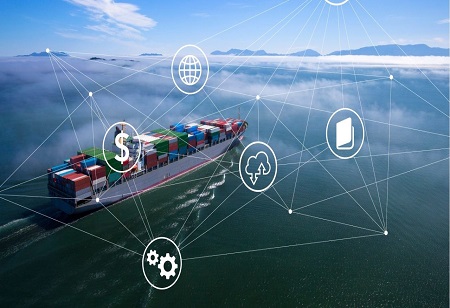
The last two years have had a profound influence on the Shipping business. The Covid-19 pandemic caused a total breakdown in the world's supply chain, which resulted in a large number of orders being cancelled, unforeseen cargo movements, and enormous losses. Additionally, shipping delays caused by shipping congestion at several ports increased the cost of transportation. The absence of real-time information at the ready disposal of shipping companies was one of the primary reasons for losses in recent times.
The shipping industry has been long considered to be ‘behind the curve’ when it comes to technological advancement. Many of the old processes followed, even today, are both time-consuming and error prone, and require documents to pass through numerous layers of approvals from customs, tax officials, health authorities, who are often separated by multiple geographic and linguistic barriers.
Blockchain can mitigate some of the issues the shipping industry has long faced. Shipping delays, frequently caused by lengthy human administrative processes, have sometimes mismanaged freight companies’ operations and preparedness. These delays often come at high costs. Hundreds of billions of disputed dollars lay idle each day as payments average 42 days to reach the invoicing corporation. Processing and administration costs can account approximately a fifth of total transportation price tags because of the labor-intensive (and error-prone) nature of manual document handling on which the sector still relies. Blockchain gives firms with the framework to eliminate these obstacles and speed up commercial activities, notably in the maritime sector. Let us look at how blockchain technology or has helped in reshaping the supply chain in shipping.
Blockchain has emerged as the key element for the effective transfer of knowledge and data throughout the commercial world. The technology's adoption gives shipping companies the opportunity to access data for order monitoring, accounting, production, managing schedules, and shipping in almost real time. Blockchain technology has the potential to reduce problems that have long plagued the shipping sector, improving efficiency. For instance, the largest retailer in the world uses blockchain technology to manage its automated system with shared single source of truth across 70 global third-party freight carriers to manage its shipments-related invoice data and payments procedures. By avoiding expensive reconciliation processes, protracted payment delays, and invoicing fraud, the company has been able to increase the profitability of its supply chain.
By boosting supply chain transparency, lowering risk, increasing efficiency, and improving overall supply chain management, blockchain-driven innovations in the supply chain have the potential to generate enormous business value for the shipping sector.
In order to maintain a single source of truth, transactions in a blockchain are duplicated across the entire network in almost real-time. All stakeholders, including buyers, sellers, shippers, and carriers, may potentially be brought together on a single encrypted platform. Real-time tracking, cargo data visibility, quicker receipts with fewer errors, and lower costs are the main advantages of shipping operations. Blockchain technology has the potential to add value beyond process improvement by facilitating smart contract execution, brokering marine insurance, and more.
Smart Contracts can also be implemented on blockchain networks. Smart contracts are computer programmes that operate on the blockchain network in accordance with the terms and conditions of a contract that has already been signed by the parties concerned. According to the agreement and Standard Operating Procedure (SOP) requirements, the code automates the flow steps.
Blockchain may potentially be used in maritime insurance to lessen the chance of loss. Typically, insurers lack access to real-time data on the risk associated with any shipment. By streamlining procedures, granting all parties (insurers, shipping companies) access to data, and integrating the necessary data with insurance contracts, blockchain can be used for risk assessment and claim handling. The world's largest insurance conglomerates intend to employ blockchain to build a 360-degree secure network throughout the shipping supply chain. This will provide them three advantages: improved risk assessment, data-backed and secure underwriting, and improved customer experience.
Recently, the government began testing the use of blockchain to track domestic trade. For tracking shipping containers as well as secure digital documentation (e-bills of lading), it has started a pilot programme for the Electronic Cargo Tracking System (ECTS).
The use of Blockchain technology in the industry is hampered by a number of issues. The most important of which are cost and limited technical training. The success of blockchain will depend on the availability of an end-to-end digital infrastructure with standards across the supply chain and all stakeholders agreeing with the use of open APIs across data interfaces. If implemented properly, blockchain can provide the shipping sector with much-needed time and financial efficiencies.
We use cookies to ensure you get the best experience on our website. Read more...